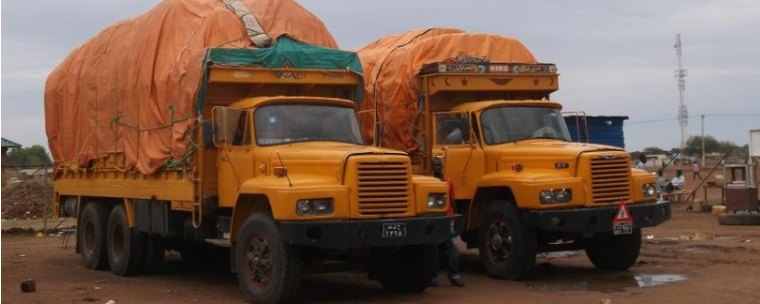South Sudan’s government has imposed a ban on the transportation of food commodities and fuel materials to Sudan’s Darfur and Kordofan regions, where the Sudanese Armed Forces (SAF) and the paramilitary Rapid Support Forces (RSF) are engaged in conflict for control.
The war between Sudan’s army chief Abdel Fattah Burhan and his former deputy and RSF commander, Mohamed Hamdan Dagalo, has since April last year killed tens of thousands, destroyed infrastructure and crippled the economy.
Several ceasefire agreements brokered by Saudi and US mediators have failed to end violence in the country.
Garang Zachariah Lual, the Information minister of South Sudan’s Northern Bahr el Ghazal State, revealed to Radio Tamazuj Thursday that several trucks destined for Sudan’s South and East Darfur states, loaded with food commodities and fuel materials, were prevented from crossing into Sudan through Aweil North County.
“The trucks currently halted at the borders are carrying food commodities, fuel, and other items prohibited from being exported to Sudan,” stated the state minister.
“The directive to implement the ban order at the borderlines came from the government of South Sudan, not just Aweil North County. This is to clarify that while borders are not entirely closed, strict enforcement measures are in place,” added the minister.
The minister clarified that the ban was implemented to address the scarcity of goods and the high prices of food commodities and other essentials in border states and regions. He denied that the motive behind the ban was to block the arrival of items to areas controlled by the Rapid Support Forces in Darfur and Kordofan regions.
Several traders, who chose to remain anonymous, told Radio Tamazuj that they had fulfilled all government requirements, including local fees, customs duties, taxes, and transit fees. However, they were notified by government authorities about the seizure of their vehicles in the Gok Machar area without being given specific reasons for the seizure.
Hamed Abdelrahman Abdurrasul, the Secretary-General of the Employers Union in East Darfur state, said: “Some time ago, there were vehicles loaded with goods that arrived at ports in South Sudan, specifically in the Gok Machar area, and were seized by the South Sudanese government. However, I believe this incident is merely a temporary setback, and the vehicles will be released.”
He continued, “There is no division between the peoples of East Darfur and Northern Bahr el Ghazal. We share longstanding relationships passed down through generations, including historical ties and agreements aimed at mutually beneficial economic exchanges.”
Speaking to Radio Tamazuj, Ahmed Abdelrahman Altahir, the Director of the Commerce Department at the Ministry of Finance in East Darfur State, said: “Here in the Commerce Department, we are dedicated to streamlining export and import procedures with South Sudan through the Samaha border crossing in East Darfur. I firmly believe that both sides rely heavily on the movement of exports and imports.”
Traders in East Darfur typically import goods such as sugar, flour, tea, dairy products, and biscuits from South Sudan, while exporting maize, tobacco, onions, and medicine to South Sudan.




